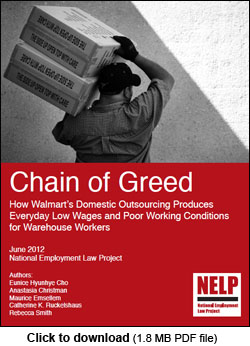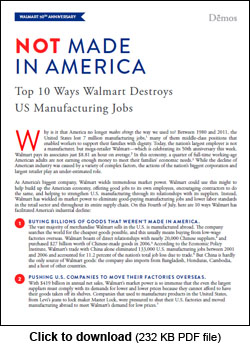NATIONAL
Modern-day shackles in Walmart’s global supply chain
By TOM GEIGER
Special to The Stand
Walmart is often criticized for low pay and inadequate benefits for its workers. While those are legitimate concerns, they only scratch the surface on Walmart’s threat to workers and communities in Washington state and beyond. This second of a three-part series explores Walmart’s global supply chain and shows how those links come together to create shackles on workers and communities here in Washington and across the globe.

Part 2 of a 3-part Special Report
Part 1: Walmart’s threat to our food, freedom, and democracy
As the largest private employer in the United States, Walmart drives down its costs and increases its profits by a shatteringly effective yet simple approach: get others to cover the costs of your business. This goes far beyond routine corporate cost-consciousness. They avoid paying taxes. They have led the way in driving suppliers to go overseas to manufacture goods at $2-a-day wages. And their level and method of contracting and sub-contracting allows them to avoid the messy consequences of illegal or immoral behavior.
In short, the way they run their business allows them to profit at the expense of everyone else.
As they drive to expand into the urban markets of Puget Sound (as covered in Part 1 of this series), these tales from the dark side are ones Walmart would rather leave untold. Unfortunately for them, more and more people — including thousands of current and former Walmart Associates who are organizing as Organization United for Respect at Walmart or OUR Walmart — are talking about and challenging their deceitful ways, and fighting back to make Walmart change.
Hiding Behind Subcontractors in the U.S.
A new report released in June 2012 by the National Employment Law Project looks at the issue of subcontracting, the impact it has on workers, and how Walmart is at the center of this national trend.
 In addition to stories of people like one worker who worked 362 days a year for years on end, often 16 hours a day with no overtime, the report covers issues around the nation of how Walmart benefits from subcontracting warehouse work and at the same time controlling it. Examples include subcontracting and temp warehouse workers in New Jersey getting $3 an average less in pay. Those warehouses connected to Walmart pay even less in wages, one in three workers reported wage theft, and one in 10 reported a workplace injury.
In addition to stories of people like one worker who worked 362 days a year for years on end, often 16 hours a day with no overtime, the report covers issues around the nation of how Walmart benefits from subcontracting warehouse work and at the same time controlling it. Examples include subcontracting and temp warehouse workers in New Jersey getting $3 an average less in pay. Those warehouses connected to Walmart pay even less in wages, one in three workers reported wage theft, and one in 10 reported a workplace injury.
The report concludes that while it is often discussed about how Walmart treats its store workers, what is:
…far less understood are the pervasive labor abuses that take place outside of Walmart’s stores but in its domestic supply chain, in service of its bottom line here in the U.S. These worker rights violations are largely the product of Walmart’s signature and aggressive practice of “outsourcing” elements of its warehousing, transportation, and goods-delivery systems to companies that, in turn, often further subcontract the work to still other entities or individuals.
These outsourced workers laboring on Walmart’s behalf toil at the bottom of a complex hierarchy of intermediaries and in alternative employment schemes that leave them vulnerable to significant worker rights abuses and unsure where to seek redress. Walmart sets the parameters for the working conditions in these facilities, sometimes directly by having managers onsite, and sometimes indirectly through monitoring suppliers’ operating costs and setting ever more stringent price demands. But when things go wrong, it’s the contractors that are blamed, while Walmart skirts responsibility for its actions and accountability for its influence over those engaged in its massive supply chain.
And this “subcontracting” approach goes beyond the warehouse. It includes companies that produce the products to feed Walmart’s gigantic supply chain as well.
News reports from Reuters in June 2012 revealed that Walmart had suspended CJ’s Seafood of Louisiana after allegations surfaced that the supplier had seriously violated labor laws. The company provided Walmart with an estimated 85% of its crawfish production.
A complaint to the U.S. Department of Labor claims that the Walmart supplier “engaged in extremely coercive employment related actions, including forcing guestworkers to work up to 24-hour shifts with no overtime pay, locking guestworkers in the plant to force them to continue to work, threatening the guestworkers with beatings to make them work faster, and threatening violence against the guestworkers’ families in Mexico after workers contacted law enforcement for assistance.”
Walmart’s response in the press was: “WalMart works with about 60,000 suppliers in the U.S. and we have rigorous standards in place that our suppliers are required to follow, including compliance with all labor standards.”
Why does it seem that these “rigorous standards” only come to light after the situation becomes public and Walmart gets heat from the outside? The abuses of these suppliers and the treatment of warehouse workers have the same root cause: Walmart’s relentless pressure on prices, forcing contractors and suppliers to cut costs below the level that allows decent working conditions. Then when the whistle blows, Walmart wipes its hands and disassociates itself from the problem.
Bangledesh and the Painful Shackles of Labor in the Poorest Parts of the World
Bangladesh is one of the leading producers of cheap clothing and garments for the world. Walmart is one of the largest, if not the largest, purchasers of those products. This became one of the last places on Earth that Walmart and others could go to get ever-cheaper labor. Workers literally worked for next-to-nothing wages as they — and they were mostly women and children — supplied the world in garments. And then through a series of protests over the past six years, workers there have fought for a better life. And companies like Walmart, who push the world’s manufacturing on a race to the bottom seem to have hit the bottom.
The good news is that the protests have brought change — two years ago protests led to successfully doubling the minimum wage there. The bad news is that a doubling of the wage rate only resulted in $37 a month. And the risk involved in joining the protest is deadly serious.
 A leader of the movement, Aminul Islam, was found murdered after he went missing in April of this year. His body showed signs of severe torture. A statement issued by U.S. Rep. Jim McDermott (D-WA) stated:
A leader of the movement, Aminul Islam, was found murdered after he went missing in April of this year. His body showed signs of severe torture. A statement issued by U.S. Rep. Jim McDermott (D-WA) stated:
“I am deeply troubled by this development and call on the Bangladeshi authorities to conduct a full investigation into Mr. Islam’s murder. Workers do not have even the most basic labor rights if they can be killed with impunity for trying to improve their working conditions.”
Walmart, as one of the largest purchasers from Bangladesh, could put pressure on the manufacturers to improve factory conditions, pay a higher wage, and respect the rights of the workers. Unfortunately, Walmart is a source of the problem, rather than an agent of positive change, as it drives down prices it will pay.
Changing Walmart Will Change the U.S. and Global Jobs Market
The impact of Walmart’s global supply chain is not limited to the misery of workers in other countries that make its products for below poverty wages or the sweatshop treatment of workers by U.S.-based suppliers. Walmart’s business model has also led directly to the dismantling of U.S. manufacturing jobs over the last several decades.
 A brutally simple fact sheet produced by the policy and advocacy center DEMOS in July 2012 provides a good review on Walmart ‘s role in the destruction of U.S. manufacturing jobs. When companies look for a cheap way out, they are often exporting the very jobs that would help maintain or rebuild the American economy. Again, Walmart’s business model of growth at any cost while pathologically lowering prices impoverishes the U.S. and global economies while enriching Walmart.
A brutally simple fact sheet produced by the policy and advocacy center DEMOS in July 2012 provides a good review on Walmart ‘s role in the destruction of U.S. manufacturing jobs. When companies look for a cheap way out, they are often exporting the very jobs that would help maintain or rebuild the American economy. Again, Walmart’s business model of growth at any cost while pathologically lowering prices impoverishes the U.S. and global economies while enriching Walmart.
Since the globalization protests of the 1990s, at WTO in Seattle and elsewhere, there have been constant clashes between the rights of people and the insistence of corporate and investor interests on having a free reign. Even as evidence mounts that corporate abuses that led to the greatest economic collapse since the Great Depression, interests including and in some cases led by Walmart are attempting to further limit democratic controls on corporate power.
For the company and its corporate allies, there are still too many limits on greed and abuse of power. One example you may have never heard of: The Trans-Pacific Partnership Agreement. It is a deal being negotiated in secret between nine nations — the U.S. and New Zealand, plus Australia, Brunei, Chile, Malaysia, Peru, Singapore, and Vietnam — for several years. But it is not so much a trade agreement between nations as an agreement designed to protect the interests of corporations and investors themselves.
While the negotiations are secret, the outcomes could affect us all. And who has three executives as advisors behind these closed doors? That’s right: Walmart. And as a corporation with trade volumes larger than most countries, Walmart surely wields an outsized influence in these negotiations.
So changing Walmart here in Washington and around the world can affect local, regional and international labor and business practices. Changing Walmart will also help us all reverse the course that continues to erode human rights. Workers in Bangladesh have shown that they can fight and win even where workers lack the most basic of rights and protections. Warehouse workers led by those organizing in Southern California and elsewhere are coming together to force better treatment in the workplace — workplaces that are major contractors and subcontractors of Walmart. And local communities here in Washington are continuing to take action to shine a light on Walmart’s threats and becoming more aware of and taking action to avoid bills that come due when Walmart comes to town with its supposedly “charitable” donation.
The Path to Change
There is straightforward path to protecting ourselves from Walmart: don’t trust Walmart’s word and force them to change. History shows that when you stand up to Walmart, you can succeed. Success this time around will mean reclaiming billions in taxes and other giveaways provided to Walmart. It will also mean a more just and humane workplace for workers here and around the globe.
Tom Geiger is Communications Director for UFCW Local 21, Washington state’s largest private sector union more than 43,000 members working in grocery store, retail, health care, meat processing, and other industry jobs.





